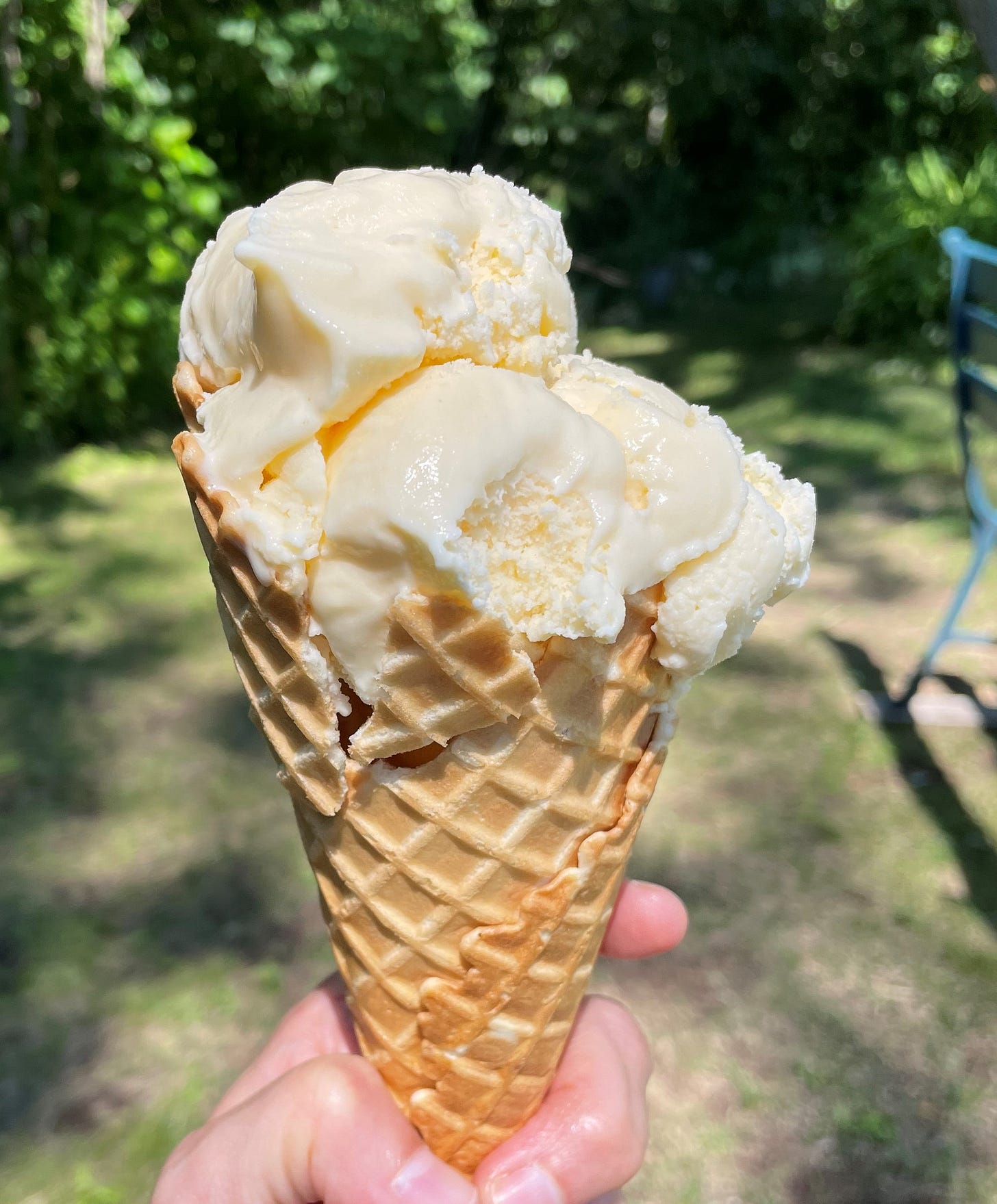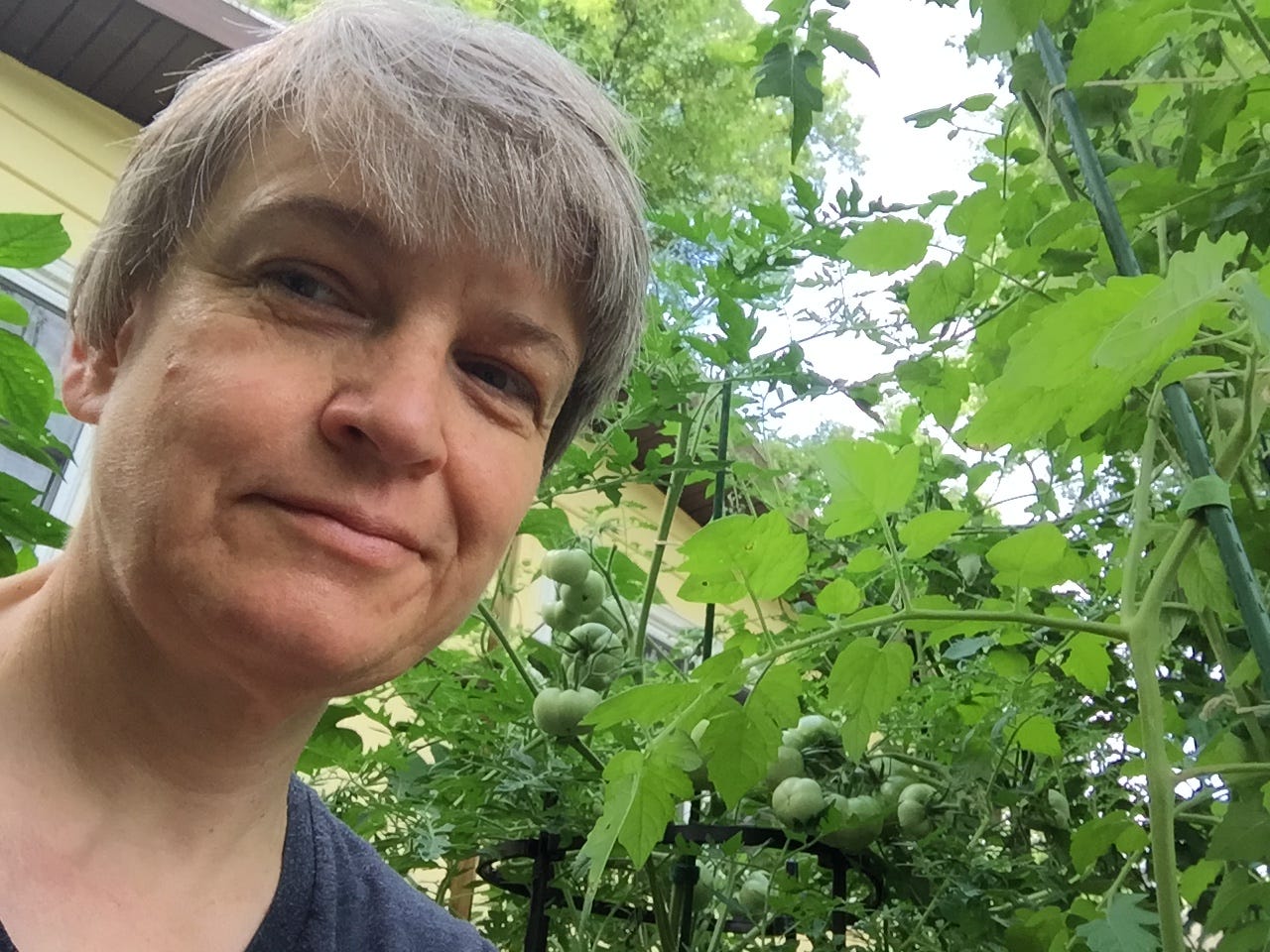On a sunny Sunday, I was on my way back from a conference. I decided to take the slow way home, through picturesque, lonely, sometimes deserted small towns across Iowa.
After the intense schedule of a five-day “DNA tumor viruses” meeting, juggling seminars, poster sessions and networking with fellow scientists, it was good to let my thoughts wonder and meander with the road ahead.
Leaving behind Adeno, Polyoma, Herpes and Papilloma viruses of all sorts, I was looking forward to talking to people about real topics, like the weather.
I was probably overly friendly and chatty with the gas station attendant, but I could not help myself. I was back in the living world, and it felt good being friendly with strangers, hearing a bird song, the buzz of insects, the wind gently dancing with the tall grass.
I stopped at an ice cream parlor to celebrate the day. An elderly man was busy folding away an OPEN sign.

“Hello! Am I too late?” I asked.
He stopped, smiled back at me, and answered that he will be happy to serve me the last treat of the day.
I was grateful. He dug a very large scoop of vanilla ice cream from the bin, carefully molded it into the large waffle cone, and gently handed it to me.
The treat was deliciously cold and creamy.
He slowly asked me what was bringing me here on this slow Sunday afternoon. I answered him with a brief explanation about the purpose of my trip, the meeting where I was presenting a poster about some work on HPV-related cancer, and putting an emphasis on how happy I was to relax on the way home.
I have learned not to overwhelm people with scientific terms and keep the discussion light, friendly and unassuming. After all, it is 2008, the HPV vaccine Gardasil had been approved not long before, and with it, a load of misinformation and controversy had spread around the U.S. I didn’t want to get into an argument with anybody that Sunday.
As soon as I said the words “HPV-related cancer”, the man’s face changed. He froze, his smile slowly disappeared, and a deep affliction took over his body. An intense sorrow filled his watery eyes.
I apologized for the distress I apparently caused. After a short silence, he said, “I am so happy to meet someone dedicated to talking about that dreadful virus! People really need to know!”
“Have you lost a loved one to cervical cancer?” I answered.
He paused and whispered: “Oh, no, it is more complicated.”
The man, who’s name is Ed, no longer cared about closing the counter. I could clearly see that he was ready to tell me more. This was not the first time this kind of thing happened to me, but the most unlikely place it did.
On a secondary road in Iowa, on a late Sunday afternoon at an ice cream parlor, I was told this tragic story I will never forget.

Ed’s grandson Nicholas had died a few weeks earlier. A 10-year-old kid suffering from a very rare disease called JORRP, or Juvenile Onset Recurrent Respiratory Papillomatosis.
The disease is caused by an HPV 6 or 11 infection of the airways. Once in the tissue, the virus triggers polyp growth leading to airway obstruction. In some cases, the disease is so severe that it will lead to the death of the patient. Nicholas was one of them.
It is believed that the infection of the infant’s airways occurs during delivery from the mother to her baby. It becomes noticeable later as the toddler has difficulties talking or breathing.
Ed took care of Nicholas a lot. Every surgery would bring some relief. And then they would go fishing together, but the obstructions would eventually come back, and the new hope for a cure faded.
“He was so sweet and courageous and never complained. Such a lovely child.”
The toll on Nicholas’s mom mental health was severe. The poor woman had to live all those years with the knowledge that she most likely infected her child with a virus she didn’t even know she had, and had to watch him suffocate and die. A family falling apart because of a benign virus.
“The doctors at the hospital were great, they helped us a lot,” Ed looked at me and shook his head. “Some people were not so nice with my daughter, saying all kinds of things that were not true. Always someone ready to point a finger and judge. She just didn’t know. We didn’t know.”
The chilly thought of the destructive power of ignorance, and of the worthless finger pointing as a problem-solving approach.
Yes, some people will die from benign infections. Some people are born with differences sometimes unnoticed or unknown that make them more vulnerable. If I wanted to bore you, I could make a list of those conditions. It is a long one.
“Oh, Ed, I am so sorry for this!” It was time to find a more cheerful turn. “You probably heard about the new vaccine called Gardasil. It will prevent infection from several strains of HPV. Mothers would no longer be a risk for their infants, ending JORRP forever.”
Ed smiled at the thought and said, “This is such incredible progress. Nicholas’ disease will no longer exist! I am so glad you stopped today. I feel so much better talking to someone who understands.”
Struggling people need all the empathy they can get, and ignorance should not be a base for policy. There is much more to learn in this world than what we can imagine.
It was an unlikely place for an unlikely conversation but we both became better people for having had it. We waved at each other and went back to out lives.
Françoise Gourronc was born in France, on the coast of Brittany. After a BS in Cell Biology and a Masters and a PhD in Bioengineering, she came to the U.S. as a Postdoctoral Research Fellow. She has worked for more than 2 decades at the Universities of Wisconsin and Iowa, studying how infectious agents or toxic compounds can affect human health.
Hear podcasts from Iowa Writers Collaborative members:
And read and support my brilliant IWC colleagues. Join us in an online Office Lounge discussion on Friday, April 28, at noon CDT. Here’s the link:
https://us02web.zoom.us/j/83172833586#success






Thank you- from another who knows the terror of a young family member with HPV related cancer.
Thank you for this story! I’m so glad you stopped for ice cream….. and made such a human connection.